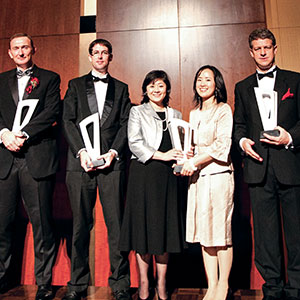Will Japan ever legalise gay marriage?
British Prime Minister David Cameron has gone out on a limb to promote it; US President Barack Obama has soundly endorsed it; the establishment fumes and rails against it; and the religious of virtually every stripe condemn it. These days, it seems, it is talked about everywhere: gay marriage.
As an openly gay man committed in a legally binding civil partnership, I’m often asked where I stand on this contentious issue. The question is usually tied in with whether—or whenever—Japan might consider it.
Perspective helps. At the time I began to understand who I was, UK law would have branded me an offender. Homosexual activity was punishable by fines and even imprisonment.
The law was not changed in England and Wales until 1967, following the Report of the Departmental Committee on Homosexual Offences and Prostitution (Wolfenden Report). Meanwhile, Scotland was even tardier—a problem for same-sex couples sharing the night sleeper from London to Inverness.
In my formative youth, there were absolutely no positive role models. Like many others, I hugely enjoyed the Julian and Sandy sketches that featured in the regular Round the Horne BBC radio programmes that were broadcast on Sundays.
We laughed at the camp-as-pink-tents stereotypes, then perhaps unaware of the heartbreak of countless men and women—and men perhaps more than women, because lesbians seemed always to have an easier time—who had to live a life of lies.
I decided very early on in my career that I could not lie and was lucky in that I had a tolerant employer (although it was said that the BBC headquarters adorned the employees’ files who were suspected of being gay with a Christmas tree symbol!).
I was lucky, too, in having a loving and caring family who did not—as so many others did their sons—reject me. Indeed when, more than 25 years ago now, I introduced my partner, they embraced him warmly and he was at once made to feel a part of the family; to this day our nieces see him as their favourite uncle.
It was an easy decision, when it became legally possible, to register our partnership. As required by law, we posted a notice of our intentions in the British Embassy Tokyo (the equivalent of bans in the local church).
The ensuing ceremony was conducted with goodwill and dignity: a choice of swearing an oath of commitment on the bible or a more secular pledge.
We left with a certificate that gives our union a legal status and certain important protections, in the UK at least. The union carries with it equally important legal responsibilities, too, as with marriage. Japanese law is actually silent on the issue, but it appears the authorities “acknowledge” such unions where one of the parties is from a state where they are legally recognised. It is highly unlikely, however, that a spouse visa would be forthcoming.
This is welcome and positive, but it is a civil partnership and not a marriage. I find myself conflicted in discussions over the issue. In my own mind, marriage is inextricably linked with religion.
Attending the weddings of my siblings, I heard them take their solemn vows according to ancient rites I can no longer relate to. So it is unlikely—especially given that my partner is Japanese—that I would actually want to walk down the aisle.
But that is not to say that those who have faith should not have the choice to do so.
It is worth noting, however, that among the heterosexual populations of many developed countries, the institution that is marriage is far less popular than ever. In those same places, religion itself is increasingly being seen as an irrelevance by many, at least where Christianity is concerned.
There remains, of course, the sensitive issue of whether same-sex couples should be allowed to adopt children. I sometimes read with revulsion, stories of straight couples who neglect or abuse, outright, their children.
Compared with the knowledge I have of same-sex couples who have demonstrated outstanding parenting, I have yet to see any definitive study that suggests there is any real disadvantage to having two parents of the same gender. What seems to matter most—and what makes the most sense—is that the child is loved and cherished.
As for Japan’s attitude, there is barely a blip on the register of concern. I suspect there are countless Japanese men and women, who would, if they could, choose to formalise their same-sex relationships.
However, I am unaware of any concerted movement to bring the issue into the public eye.
There is—as far as I know—no Japanese equivalent of Stonewall, the UK’s lesbian, gay and bisexual rights charity. I know of only one Japanese lawmaker who is openly gay, but a recent high-profile victory for gay rights may suggest times are changing. After a Twitter-led outcry in March against Tokyo Disney Resort’s refusal to let a lesbian couple perform a “marriage ceremony” on its premises unless one of them was dressed as a man, the theme park apologised and said all same-sex couples would now be welcome to hold their fairy-tale celebration alongside Micky and his friends.
Meanwhile, the role models put forward in the media tend—as they tended to in 1960s Britain—to be little more than stereotypes, and none of them positive.






